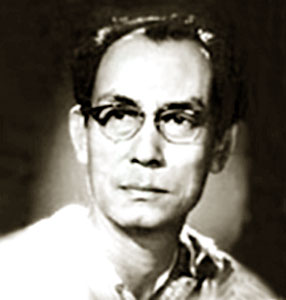


Remember that delightful Asha - Kishore duet ‘Chhod do aanchal’? During the rehearsal Asha Bhosle wasn't getting into the proper mood. She was sitting quietly with some worries on her mind. Suddenly a man tapped her on the head. Startled Asha let out a sound- "Aah"! The man said, "Yes, that's the expression I am looking for." That 'Aah' gave the perfect naughty start for the song. That man was a genius of a composer called Sachin Dev Burman - Sachinda or simply S.D.!
Born on 1st October 1906 at Komilla, Sachinda took his first musical lessons from his father and later from noted vocalists K.C.Dey and Badal Khan. His tunes from Bengali films caught the ear of the famous producer Chandulal Shah who then invited him to Bombay. Shaking off initial apprehension S.D. entered Bombay's savvy Hindi film world. In 1946, the silver screen introduced Sachin Dev Burman as the music director of Filmistan's'Shikari'. That was the begining.
Over the next 3 decades, Sachinda's music stood tall amongst the giants and the pygmies alike - establishing an endearing identity. Sweetness was its main theme and simplicity, the added attraction. Just the right balance of Indian and western music, a soothing orchestration and the ability to compose according to the situation were S.D.'s trademarks. Add to this the terrific chemistry he shared with gifted lyricists like Majrooh, Shailendra and Sahir and one understands the secret of his success. No wonder he outlasted almost all of his contemporaries who couldn't keep pace with times. His exceptional musical sense and malleability ensured that changing musical trends would never render his tunes obsolete. His greatness was that in changing with times he never succumbed to mediocrity.
As a composer he was never dependent on a particular singer and could come good with anyone. That was his strength. Songs like Rafi's crackerjack ‘Sar jo tera chakraye’, Kishore's peerless ‘Phoolon ke rang se’, Manna Dey's masterly ‘Poochho na kaise’ and Hemant Kumar's superb ‘Jaane woh kaise’ demonstrated S.D.'s ability to extract what he wanted from any singer. To dispel any lingering doubts just listen to Lata's heavenly ‘Phailii hui hain sapnon ki baahein’, Asha's emotionally charged ‘Abke baras bhej’, Geeta's enticing ‘Jaane kya tune kahii’ and Suman's soulful ‘Na tum humein jaano’!
S.D.'s own singing played no mean role in his music. His distinct bass voice with a folkish flavour made all his songs like ‘Wahan kaun hai tera’, ‘Mere saajan hai us paar’ and ‘Prem ke pujari’ memorable.
His was the guiding spirit for many an artist. For Geeta Dutt he invented the 'sad songstress' image through ‘Mera sundar sapna beet gaya’ and later on craftily casted her as a seductive singer through ‘Suno gajar kya gaaye. Asha Bhosle regards him as her mentor who taught her the nuances of playback singing. Kishore Kumar credited him for shaping his musical destiny. And who can ever forget his role as a father, philosopher and guide in Rahul Dev Burman's career?
Today , more than three decades after S.D. Burman's demise his magical music in 'Munimji', 'Pyaasa', 'Bandini', 'Guide' and 'Abhiman' still sounds as fresh as ever. For this man - a descendent of the royal family of Tripura - the musical philosophy was pretty simple - 'My songs are not for the ustaads. They are meant for common people.' That's why he could rule the hearts of music lovers from all walks of life through his simple, sweet compositions!
No prizes for guessing the short form for 'sweet music' in my dictionary. It is 'S.D.'!